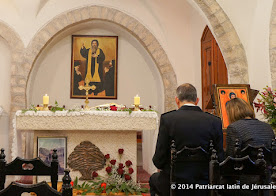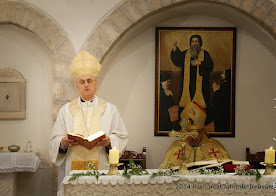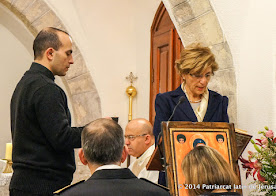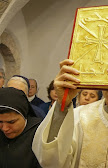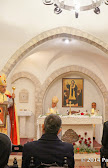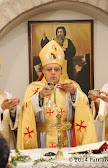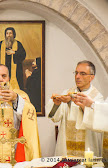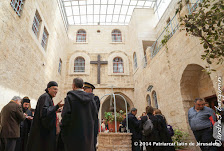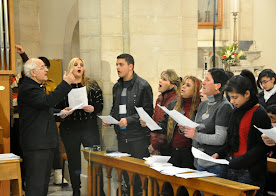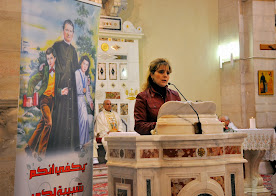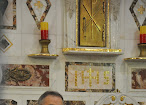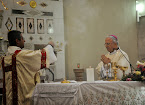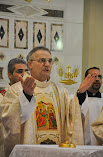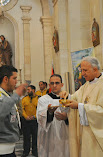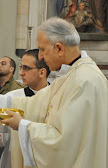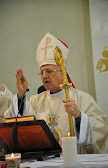PRESS RELEASE - Leaders of the Catholic Church in the Holy
Land published yesterday, 20 February 2014, a declaration asking the
Municipality of Tel-Aviv to cease its campaign against places of worship of
migrant communities in South Tel-Aviv.
Keep the places of prayer open in Tel-Aviv!
We, the ordinaries of the Catholic Church in the Holy Land,
have heard the cry of the faithful--Christians, Orthodox, Protestants, and
Evangelicals--who are migrant workers and asylum seekers in the city of
Tel-Aviv. They are also our brothers and sisters.
We have learned over the course of the past weeks that the
Municipality of Tel-Aviv has shut down numerous places of worship in the suburb
South Tel-Aviv. In certain cases, furniture has been confiscated.
Migrants gathered what little they had to establish Christian
communities and places of prayer in apartments, shops, cellars, and shelters.
They transformed these places into oases of prayer and solidarity where they
could gather and be consoled by the Almighty and console each other since they are facing poverty and destitution, exile, and loneliness.
We recognize the right of civil authorities to enforce the
law and maintain order, but we turn to them to ask for goodness and mercy for
our brothers and sisters. Their churches and places of prayer are also holy
places that must be favored and protected. We ask that this campaign against
the churches of South Tel-Aviv be transformed into a campaign to help the
churches respond to their civil obligations and to continue to serve the
faithful.
Thus says the Lord of
hosts: Judge with true justice, and show kindness and compassion toward each
other. Do not oppress the widow or the orphan, the resident alien or the poor; do not plot evil against one another in your
hearts. (Zachriah 7:9-10)
+ Fouad TWAL
Latin Patriarch of Jerusalem
President of the Assembly of Catholic Ordinaries of the Holy Land
+ Elias CHACOUR
Greek Catholic Melkite Archbishop Emeritus of St. John of Acre
+ Michel SABBAH
Latin Patriarch Emeritus of Jerusalem
+ Yaser Al-AYYASH
Greek Catholic Melkite Archbishop of Petra and Philadelphia (Amman)
+ Jean B. SLEIMAN
Apostolic Administrator 'sede plena' of the Eparchy of Petra and Philadelphia
+ Joseph SOUEIF
Maronite Archbishop of Cyprus
+ Moussa AL-HAGE
Maronite Archbishop of Haïfa & the Holy Land
Exarch Maronite de Jérusalem
Apostolic Administrator of the Greek-Catholic Melkite Eparchy of St. John of Acre
+ Boutros MOUALLEM
Greek Catholic Melkite Archbishop Emeritus of St. John of Acre
+ Gregoire Pierre MELKI
Syrian-Catholic Exarch of Jerusalem
+ Joseph Jules ZEREY
Greek-Catholic Melkite Patriarchal Vicar of Jerusalem
+ Maroun LAHHAM
Latin Patriarchal Vicar for Jordan
+ Giacinto-Boulos MARCUZZO
Latin Patriarchal Vicar for Israel
+ William SHOMALI
Latin Patriarchal Vicar for Jerusalem et la Palestine
+ Kamal-Hanna BATHISH
Latin Patriarchal Vicar Emeritus
+ Selim SAYEGH
Latin Patriarchal Vicar Emeritus for Cyprus
Msgr. Joseph KELEKIAN
Armenian Catholic Exarch of Jerusalem
Fr. Pierbattista PIZZABALLA, OFM
Custody of the Holy Land
Fr. David NEUHAUS, S.J.
Latin Patriarchal Vicar for Catholic Hebrewphones
President of the Commission for Dialogue with the Jewish People
Fr. Jerzy KRAJ, OFM.
Latin Patriarchal Vicar forCyprus
Fr. Raymond MOUSSALLI
Chaldean Patriarchal Vicar for Jordan
Père Pietro FELET, scj
Secretary General
Original press release in French [below]; translation by Al-Bushra
«Gardez ouvertes les oasis de
prière à Tel Aviv!»

COMMUNIQUE – Les responsables de l’Eglise Catholique de Terre Sainte ont
publié hier, 20 février 2014, une déclaration qui demande à la municipalité de
Tel Aviv de cesser sa campagne contre les lieux de prière des communautés de
migrants à Tel Aviv Sud.
Gardez ouvertes les oasis de prière à Tel Aviv !
Nous, ordinaires de l’Eglise Catholique de Terre Sainte, avons entendu le
cri des fidèles chrétiens, orthodoxes, protestants, évangéliques, qui sont
travailleurs immigrés et demandeurs d’asile dans la ville de Tel Aviv. Eux
aussi sont nos frères et sœurs.
Nous avons appris qu’au cours des dernières semaines la municipalité de Tel
Aviv a fermé de nombreux lieux de culte dans la banlieue Sud de Tel Aviv. Dans
certains cas, leurs meubles ont été confisqués.
Les migrants ont rassemblé le peu qu’ils avaient afin de fonder des
communautés chrétiennes et des lieux de prière dans des appartements, des
boutiques, des caves et des abris. Ils ont transformé ces lieux en oasis de
prière et de solidarité. Il y a des lieux où ils peuvent se rassembler et être
consolés par le Tout-Puissant, et se consoler les uns les autres, puisqu’ils se
confrontent à leur pauvreté et leur dénuement, à leur exil et leur solitude.
Nous reconnaissons le droit qu’ont les autorités civiles d’appliquer la loi
et de faire régner l’ordre, mais nous nous tournons vers elles pour leur
demander bonté et miséricorde pour nos frères et sœurs. Leurs églises et lieux
de prière sont aussi des lieux saints qu’il faut favoriser et protéger. Nous
demandons que cette campagne contre les églises de Tel Aviv Sud soit
transformée en une campagne pour aider les églises à répondre à leurs
obligations civiles et à continuer à servir les fidèles.
Voici ce que
déclare le Seigneur des armées célestes :
Rendez des
jugements conformes à la vérité, témoignez-vous mutuellement de l’amour et de
la pitié.
N’exploitez
pas la veuve et l’orphelin, ni l’immigré et ceux qui sont dans le besoin,
et ne tramez
aucun mal dans votre cœur les uns contre les autres.
(Zacharie 7
:9-10)
+ Fouad TWAL
Patriarche Latin de Jérusalem for
Président de l’Assemblée des Ordinaires Catholiques de Terre Sainte
+ Elias CHACOUR
Archevêque Grec-Catholique Melkite émérite de Saint-Jean d’Acre
+ Michel SABBAH
Patriarche Latin émérite de Jérusalem
+ Yaser Al-AYYASH
Archevêque Grec-Catholique Melkite de Petra et Philadelphia (Amman)
+ Jean B. SLEIMAN
Administrateur Apostolique ‘sede plena’ de l’éparchie de Petra et Philadelphia
+ Joseph SOUEIF
Archevêque Maronite de Chypre
+ Moussa AL-HAGE
Archevêque Maronite de Haïfa & de Terre Sainte
Exarque Maronite de Jérusalem
Administrateur Apostolique de l’éparchie Grecque-Catholique Melkite de Saint
Jean d’Acre
+ Boutros MOUALLEM
Archevêque Grec-Catholique Melkite émérite de Saint Jean d’Acre
+ Gregoire Pierre MELKI
Exarque Syrien-Catholique de Jérusalem
+ Joseph Jules ZEREY
Vicaire Patriarcal Grec-Catholique Melkite de Jérusalem
+ Maroun LAHHAM
Vicaire Patriarcal Latin pour la Jordanie
+ Giacinto-Boulos MARCUZZO
Vicaire Patriarcal Latin pour Israël
+ William SHOMALI
Vicaire Patriarcal Latin pour Jérusalem et la Palestine
+ Kamal-Hanna BATHISH
Vicaire Patriarcal Latin émérite
+ Selim SAYEGH
Vicaire Patriarcal Latin émérite pour Chypre
Msgr. Joseph KELEKIAN
Exarque Arménien Catholique de Jérusalem
Fr. Pierbattista PIZZABALLA, OFM
Custode de Terre Sainte
Fr. David NEUHAUS, S.J.
Vicaire Patriarcal pour les Catholiques Hébréophones
Président de la Commission de Dialogue avec le Peuple Juif
Fr. Jerzy KRAJ, OFM.
Vicaire Patriarcal Latin pour Chypre
Fr. Raymond MOUSSALLI
Vicaire Patriarcal Chaldéen pour la Jordanie
Père Pietro FELET, scj
Secrétaire Général












